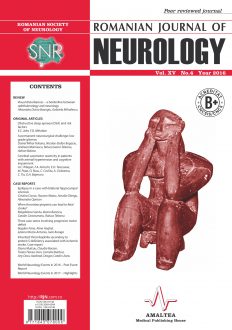SELECT ISSUE

Indexed

| |

|
|
|
| |
|
|
|

|
|
|
|
|
|
| |
|
|
HIGHLIGHTS
National Awards “Science and Research”
NEW! RJN has announced the annually National Award for "Science and Research" for the best scientific articles published throughout the year in the official journal.
Read the Recommendations for the Conduct, Reporting, Editing, and Publication of Scholarly work in Medical Journals.
The published medical research literature is a global public good. Medical journal editors have a social responsibility to promote global health by publishing, whenever possible, research that furthers health worldwide.
CEREBRAL VASOMOTOR REACTIVITY IN PATIENTS WITH ARTERIAL HYPERTENSION AND COGNITIVE IMPAIRMENT
A.C. Ribigan, F.A. Antochi, E.O. Terecoasa, M. Popa, O. Rusu, C. Coclitu, A. Ciobotaru, C. Tiu and O.A. Bajenaru
ABSTRACT
Objectives. The aim of our study is to determine whether cerebral vasomotor reactivity is impaired in patients with arterial hypertension and cognitive impairment and how this hemodynamic parameter is associated with different functions of cognition.
Materials and methods. We included 87 patients with arterial hypertension divided into two groups, one with neurocognitive impairment ranging from mild to severe aged between 47 and 90 years (70.2 ± 11.4) and the second group without cognitive impairment aged between 41 and 86 years (60.1 ± 11.4). We excluded patients with significant hemodynamic cervico-cerebral arterial stenoses, arrhythmias and other diseases that may impair cerebral vasomotor reactivity. All the patients underwent assessment of vasomotor reactivity and neurocognitive functions.
Results. BHI values were significantly lower in the first group of patients compared to the second one. The percent of patients with impaired cerebral vasomotor reactivity was significantly higher in the group of patients with cognitive impairment, as compared to the other group (54.35% vs 29.27%, p=0.01). There was a significant statistical difference between the MMSE, MOCA and clock test scores among patients with and without impaired vasomotor reactivity. This difference was also maintained for visuospatial/executive, naming and language domains of the MOCA test.
Conclusions. Impaired cerebral vasomotor reactivity is more frequent in patients with arterial hypertension and cognitive impairment. Patients with arterial hypertension and impaired vasomotor reactivity have poorer cognitive performance, cognitive functions most affected in patients with impaired vasomotor reactivity being language, visuospatial and executive ones.
Keywords: cerebral vasomotor reactivity, breath holding index, neurocognitive impairment, MOCA, MMSE
Full text | PDF
